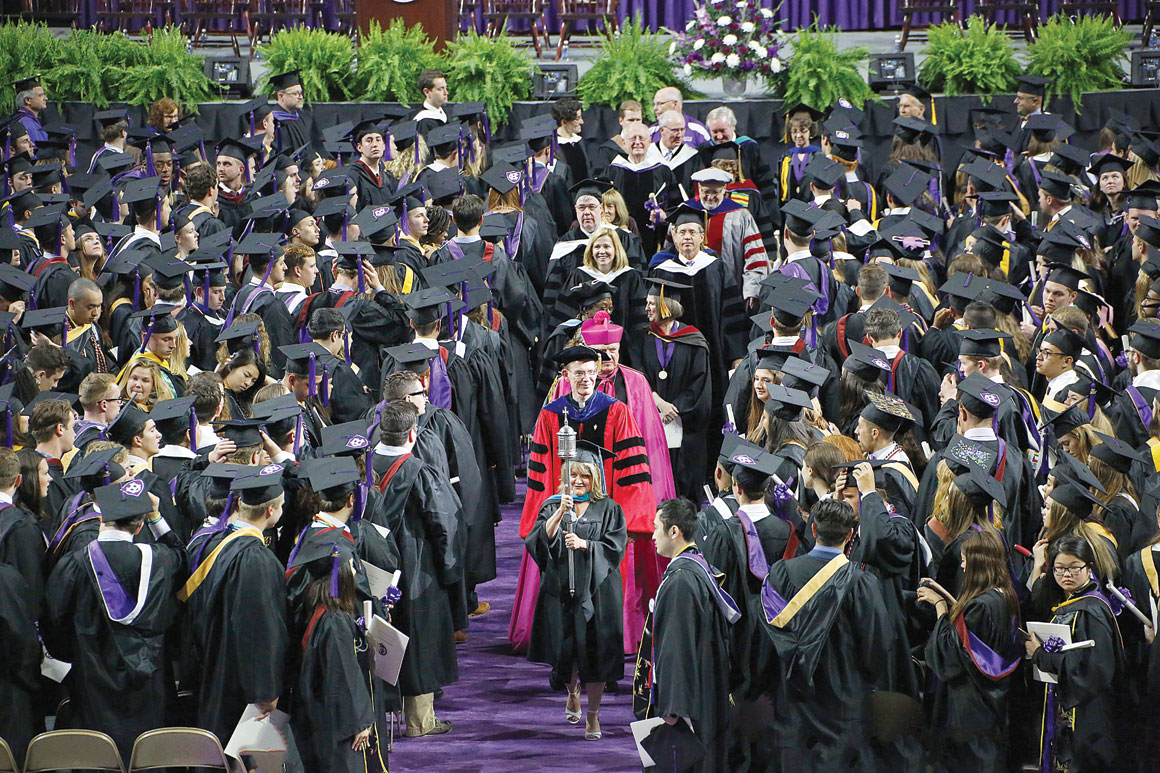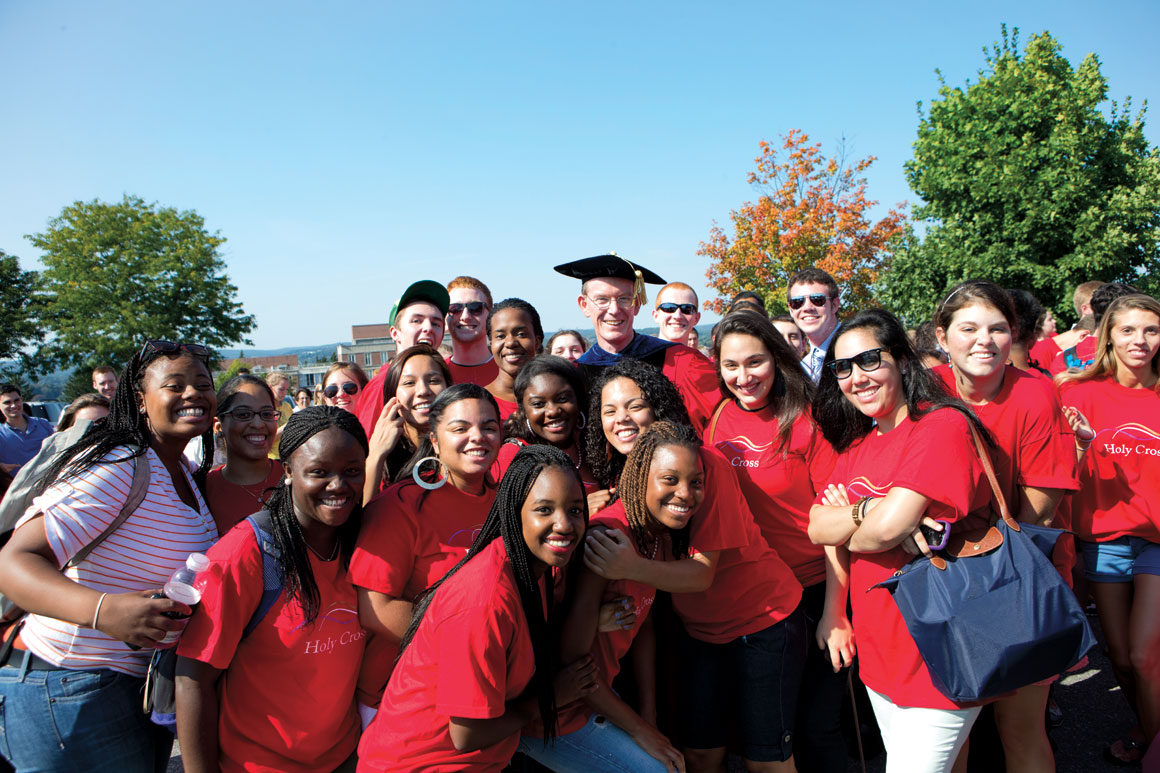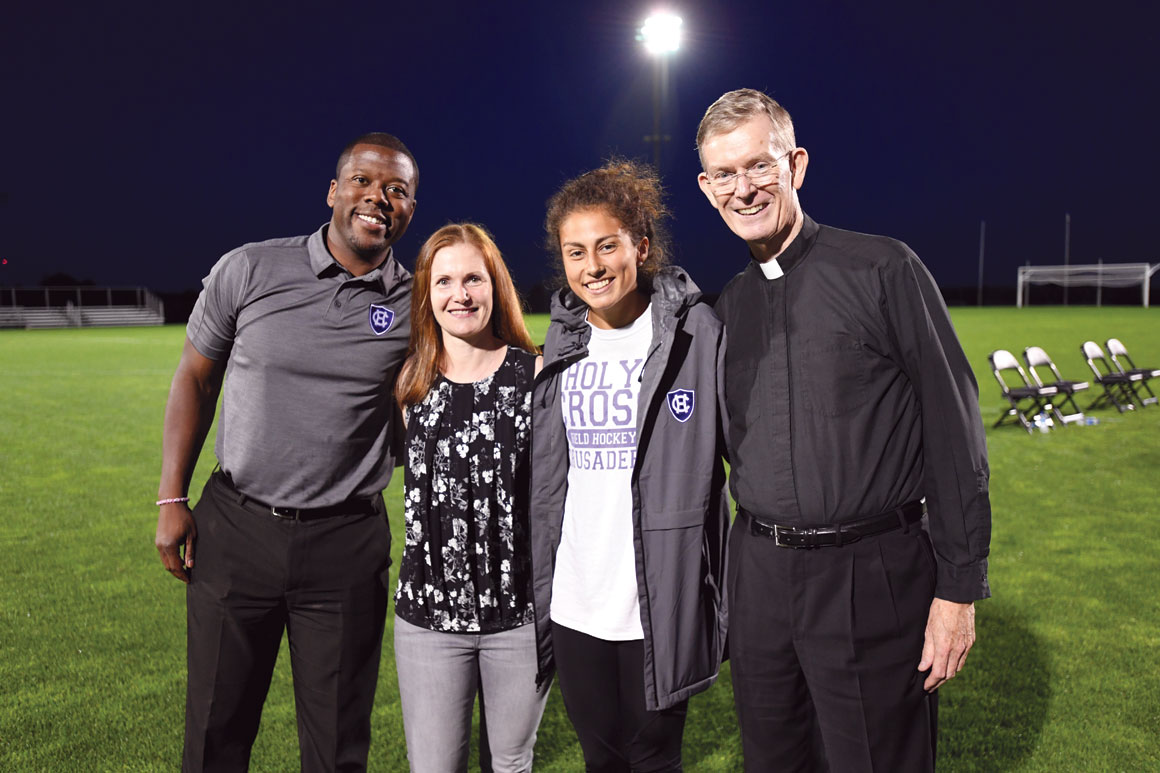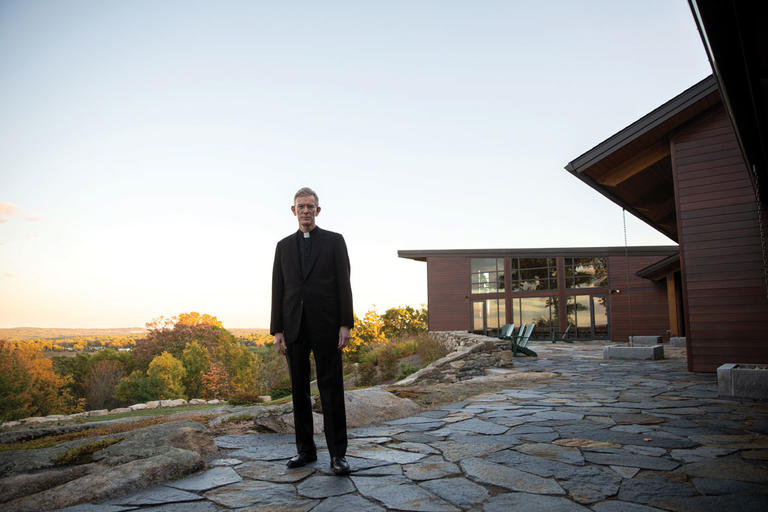The following story about Fr. Boroughs ran in the spring 2021 issue of Holy Cross Magazine.
Friends, family, colleagues and peers reflect on how Rev. Philip L. Boroughs, S.J., combined Jesuit values with practical leadership during his nine-year presidency that transformed Holy Cross for generations.
By Maura Sullivan Hill
The presidents of all U.S. Jesuit colleges and universities get together for a meeting each year, a traditionally all-male gathering. But in 2014, Linda LeMura of Le Moyne College in Syracuse, New York, joined their ranks as the first female layperson to serve as president of a Jesuit college or university in the United States.
She remembers being nervous at the beginning of that first meeting — until she met her peer from Holy Cross.
“His kindness is something I will never forget,” LeMura says. “I must have looked somewhat lost, not knowing where to sit, and he made it a point to place my name placard right next to his so that we could sit together. When he did that, I felt like I had an immediate friend who wanted me to feel like a member of the group.”
Friends, family, peers and colleagues say LeMura’s experience is not uncommon, and that sensitivity, inclusivity and care for others are hallmarks of the life and career of Rev. Philip L. Boroughs, S.J., and are the qualities that have enabled him to cultivate strong relationships and unite the Holy Cross community around his vision for the future of the College.
From physical spaces to intellectual and spiritual life, Fr. Boroughs, 71, has left an indelible impact during his nine years as president of the College of the Holy Cross, a post he began in January 2012 and will leave on June 30, 2021.
“Phil had all the many bona fides needed to be a successful president for Holy Cross — he’s a respected manager, a deft corporate developer, a dynamic public speaker, a humble priest and a talented academician,” says P. Kevin Condron ’67, P00, a longtime board member and board chair from 2008-2014. “What really set him apart is his style. He has an openness that allows everyone to feel included and to have their voice heard. He has a humble, easy way about him that helped him open up to Holy Cross and Holy Cross open up to him.”
What Fr. Boroughs accomplished during his tenure as Holy Cross’ 32nd president is distinctly measurable, such as $420 million raised during the College’s historic Become More campaign, yet also intangible.

Presiding at Mass in St. Joseph Memorial Chapel.
The Pastor as President
“There is a deep pastoral sense in Phil Boroughs,” says Rev. Paul F. Harman, S.J., the College’s inaugural vice president for mission. Many who have worked with Fr. Boroughs over the years echo this statement, citing his ability to minister to the community as one of his greatest strengths.
“There’s an element of pastoral leadership [to Fr. Boroughs] that I love and enjoy. He is concerned for your physical, mental and emotional well-being, and your family members,” says Stanley Grayson ’72, who has served multiple terms on the board of trustees and worked closely with Fr. Boroughs. “I’d be curious about how many weddings or funerals of alumni and their family members he has attended over the past nine years. People take a great deal of comfort in his presence in good times and bad times; and over these few years we’ve had a lot of both.”
When tragedy struck the Holy Cross community in January 2020 and a member of the women’s rowing team, Grace Rett ’22, was killed in a car accident while on a training trip in Florida, Fr. Boroughs immediately traveled to be with the team.
“At that moment, President Boroughs checked out and Fr. Phil Boroughs checked in,” says Rick Patterson ’80, current board chair. “He was on an airplane to go take care of students, coaches and families who were in need. And that’s all that mattered.”
This ability to be present for people and to cultivate deep personal relationships stems partially, of course, from Fr. Boroughs’ pastoral formation as a Jesuit priest. Sr. Donna Markham, O.P., longtime friend, former colleague, and president and CEO of Catholic Charities USA, recalls a time when one of his Georgetown colleagues fell ill with cancer.
“I watched how Phil sensitively accompanied her through her illness up to her death. For him, that accompaniment is such a natural response coming from a man whose entire life is grounded in the Gospel. I know this was no isolated pastoral act for Fr. Boroughs,” she says.
His sister, Pat Boroughs, notes that this ability is an innate gift, one he has cultivated since their youth, when he watched their parents develop close relationships at their parish, St. Francis of Assisi in Seahurst, Washington, south of Seattle.
All five Boroughs children — Pat, Ken, Phil, Shelagh and Mick — attended the parish school at St. Francis of Assisi, and their parents, Robert and Catherine, were active supporters and volunteers at the parish and in their greater Seattle community.
“Our parents established longtime, wonderful relationships with people in our parish, and Phil, too, has the natural gift that I see in all of us in our family — of establishing wonderful friendships,” says Pat, the oldest of the siblings. “Both our parents had strong faith. They were leaders in our parish and very involved in lots of volunteer ways. Our parents’ volunteer work and leadership has been picked up by all five of us in our own lives. With Phil, he is also an excellent listener.”
Much like a parish pastor listens to and ministers to his community, colleagues say Fr. Boroughs has done the same for Holy Cross, as well as for those he served previously as a faculty member and administrator at Jesuit schools, including Seattle University, Gonzaga University and Georgetown; when working with Jesuits in formation in the Oregon Province; and as a parish priest at St. Leo Church in Tacoma, Washington, and St. Therese Parish in Seattle.
“He has had experience as a pastor and it would not surprise me if that would be something he would be very comfortable doing again in the future,” Fr. Harman notes.

At the class of 2017 Commencement at the DCU Center in Worcester.
One Title, Two Roles
Vowed religious who lead organizations may have one official job title, but the role is two-fold: overseeing the managerial and operational tasks as a president/CEO and also ministering to the spiritual and emotional needs of the extended community as a priest or sister.
“It is a rare thing for a leader to possess equal amounts of administrative competence and pastoral sensitivity grounded in a life of prayer and dedication,” Sr. Markham says. “I believe it is this uncommon balance in Fr. Boroughs that has made him the wonderful leader he is at Holy Cross and throughout his life.”
Patterson describes Fr. Boroughs as a “careful listener”: “I have not been with a person who prepares so thoroughly for each and every moment that he’s with other people, whether it is leading a gathering or a speaking engagement or a board meeting.”
This thoroughness and attention to detail also date back to childhood, notes older brother, Ken. “Phil was always the student,” he recalls. “We would get home from St. Francis, get out of our uniforms, and I would head for the woods near our house. But Phil would get his homework done right away, before dinner. He was committed to his studies and developing his mind and his intellect.”
After joining the Jesuits as a novice in 1969, Fr. Boroughs studied at Gonzaga, graduating with a Bachelor of Arts in philosophy in 1973. Continuing his studies in tandem with years of the traditionally long formation of a Jesuit priest resulted in a Master of Divinity degree from the Jesuit School of Theology in Chicago, a Licentiate of Sacred Theology from the Jesuit School of Theology of Santa Clara University in Berkeley, California, and a Ph.D. in Christian spirituality from the Graduate Theological Union in Berkeley. Ordained in 1978, he professed his final vows in 1986.
“I remember introducing him at a gathering at Hogan Campus Center shortly after he arrived, a chance to talk informally about himself,” Fr. Harman recalls. “It made a big impression on me because he said how happy and comfortable he is in being a Jesuit priest. I am always happy to hear a brother Jesuit speak of what gives them joy and energy, and that stayed with me.”

Blessing a statue of St. Peter Faber in the Hogan Courtyard, August 2019.
Decisions and Discernment
Discernment, the Ignatian approach to decision-making and a key Jesuit practice, has been a cornerstone in Fr. Boroughs’ life. It is a principle he has embraced wholeheartedly throughout his priesthood up through leading a college in the 21st century. Over the course of his presidency, Holy Cross has faced a series of significant challenges and controversial issues, from micro — examining the College’s longtime moniker and mascot — to macro — leading the Holy Cross community through a historic worldwide pandemic. At the heart of his decision-making, regardless of issue, colleagues say, is careful discernment and thoughtful direction, considering how a choice will impact everyone while trying to care for all involved or impacted.
“His practice of Ignatian discernment is a very real part of his life and how he lives it,” says Patterson, who has worked with Fr. Boroughs on several major decisions as board chair. “I’ve seen that clearly over the past two and a half years. To see all the work, the research he undertook personally, to see all the people he was in touch with to get a point of view; he would have a conversation about it, challenge people, be challenged, really talk about it. And then there were quiet periods, where he was praying and thinking.
“Some of these decisions took many months, and he was in no hurry,” Patterson continues. “He really just wanted to be thorough and be at peace with his decision. I hadn’t had such a tangible experience with a person going through that kind of process on a matter so meaningfully.”
LeMura, president of Le Moyne, counts Fr. Boroughs as a confidant and supporter when she is faced with decision-making on her Jesuit campus.
“It was always clear to me that he was a student of history. He studied the origins and the original intention of the Crusader serving as a mascot. And he also studied the legacy of Fr. Mulledy in Jesuit history,” LeMura says, referencing the head of the Maryland province who in 1838 authorized the sale of enslaved persons owned by the Society of Jesus to pay off debts at Georgetown. Five years later, Fr. Mulledy became Holy Cross’ first president. In September 2020, the College removed his name from a residence hall named for him in 1966.
“And, as any good professor would do, he shared the historical context of the issues and then, in a compelling way, shared the reasons to take a fresh look at these issues in the 21st century,” she notes. “He embodies this constant evolution of Jesuit education to keep the context fresh and cutting edge and relevant — not merely keeping the status quo for the sake of keeping the status quo.”
Adds Sr. Markham: “I know Fr. Boroughs to be a man of deep faith. His grounding in Ignatian spirituality permeates everything he does. Discernment, prayer, practicality and a palpable compassion for those who are experiencing hardships of one sort or another have been characteristics I have long observed and admired in him.”
At Georgetown and Holy Cross, Fr. Boroughs led efforts to develop and endow spaces where students and faculty could engage in their own discernment, prayer and reflection. At Holy Cross, that drive resulted in the creation of the Thomas P. Joyce ’59 Contemplative Center, a 33,800-square-foot facility where students, faculty, staff and alumni can retreat for prayerful reflection and thought.
The first of four buildings funded by the record-breaking $420 million Become More campaign, the center opened in 2016, the realization of a long-held dream of the College, which lacked dedicated retreat space on campus. The $22 million facility is set atop 52 wooded acres overlooking the Wachusett Reservoir in West Boylston, Massachusetts, 15 minutes away from Mount St. James; the distance allows proximity to campus while also providing an opportunity to truly retreat into stillness and contemplation. Long home to a vigorous, active retreat program, the College sees nearly 25% of its student body participate in a retreat at the center during their years on campus, experiencing the same kind of discernment central to their president’s life.

Holy Cross’ new president is surrounded by students on his Inauguration Day, Sept. 14, 2012, the Feast of the Exaltation of the Holy Cross. Clad in matching red shirts, clapping and cheering students lined the processional path from Hogan Campus Center to the Hart Center.
Championing Inclusion and Equality
The values of inclusivity, diversity and equality are hallmarks of the Society of Jesus; Fr. Boroughs’ sister, Pat, saw him embrace these principles long before he joined the Jesuits.
“A sense of justice and sensitivity has been part of my brother’s life for a long time. When Phil was a junior at Seattle Prep, he was president of the Seattle Archdiocese CYO. They were looking for a venue for an event, and when Phil and a couple of others met with people at the Elks Club, they realized that Black people were not allowed. And so [they] made it known that they would not be holding their event at the Elks.”
At Holy Cross, Fr. Boroughs worked to increase diversity on the College’s board of trustees. When Grayson first served in the 1990s, he was the only Black trustee. He returned to serve another term in 2016, at Fr. Boroughs’ request.
“Fr. Boroughs said to me, ‘I need you to help me build a board that is more reflective of the society we live in and, more importantly, the graduates we produce.’” Grayson recalls. “Now there are three African Americans and several Latinos on the board. It is a deliberate way of building diversity on the board and, more importantly, building a bench for future members.”
His commitment to diversity started at the top with the board of trustees and has been felt across all facets of campus life. In 2015, Fr. Boroughs created a new role in his administration: associate dean for diversity and inclusion and chief diversity officer, a cabinet-level position that four years later was elevated to associate provost for diversity, equity and inclusion (DEI). A focus on the recruitment and retention of diverse faculty and staff has remained a constant since 2015; over the past five years, 38% of the tenure-track faculty hires have self-identified as African American, Latino/a/x or Hispanic, Asian American or Native American, and 55% as women.
In early 2019, the College formed a Diversity, Equity and Inclusion Planning Group, which developed a strategic plan for improving campus climate in those areas. Following the group’s report, Fr. Boroughs appointed a DEI Implementation Team, which issues reports on progress at the start of every semester. Last July, in response to the nationwide movement for racial justice, Fr. Boroughs announced a 40-point anti-racism action plan to promote dialogue and concrete initiatives to further the College’s anti-racism commitments. Two months later, he announced the removal of Fr. Mulledy’s name from the former Brooks-Mulledy residence hall.

At the 2020 topping off ceremony for the Prior Performing Arts Center.
Becoming More
For a man who literally and figuratively changed the landscape of Holy Cross, it’s ironic that Fr. Boroughs had never stepped foot on Mount St. James before his first opportunity to serve the College.
It was 2008, four years before the start of his eventual presidency, when Fr. Boroughs, then vice president for mission and ministry at Georgetown University, joined the Holy Cross board of trustees sight unseen; he had never been to campus. He was a natural choice for the board, but before accepting, he called his friend Rev. John Endres, S.J., ’68.
“I said, ‘Please do it,’” Fr. Endres recalls. “And I think he was very pleased to be asked.”
Fr. Boroughs had first learned about the Jesuit college 3,100 miles east when he met Endres in the Jesuit novitiate in Sheridan, Oregon, in the late 1960s. Today, the campus he had never seen has been transformed under Fr. Boroughs’ leadership.
One year into his presidency, the College kicked off the boldest fundraising campaign in its then-170-year history, Become More: Campaign for the Future of Holy Cross. With a $400 million goal, the campaign centered around the belief that a Holy Cross liberal arts education — one that develops mind, body, spirit and community — was more essential than ever in today’s world, and strove to raise funds that would strengthen every aspect of the College: academics, Athletics, mission, financial aid, students, community and more. With a length of seven years, the endeavor would stretch the majority of Fr. Boroughs’ tenure, exceed its fundraising goal and transform the College in ways that will impact generations.
“The vision of the campaign was so bold from a campus improvement perspective, and to see the way that Father was able to keep the focus on the broader vision, Become More, was remarkable,” says Anne Fink ’85 P17, a campaign co-chair. “Fr. Boroughs guided the work and the priorities, keeping the people who were working on it focused, and then also engaging all of the constituents who played such a role in the generosity involved in bringing these projects to life.”
The most visible results of the campaign can be found in the four buildings that resulted from Become More, three of which have literally changed the landscape of upper campus: the $95 million Hart Center at the Luth Athletic Complex, which opened in 2018, renovating and expanding upon the aging Hart Center; the $32.5 million Joanne Chouinard-Luth Recreation and Wellness Center that, opening earlier this year, replaced the long-outdated Field House; and the $107 million Prior Performing Arts Center, an 84,000-square-foot facility that will debut in 2022, providing a home for the fine and performing arts, as well as spaces and technology to support interdisciplinary creativity between the arts and other areas of study.
“It was never just about the buildings, but about mind, body, spirit and community,” notes Fink, who also chaired the board of trustees’ buildings and grounds committee during the campaign years. “The physical buildings were a way to manifest that and bring that to life. In a relatively short amount of time, the campus was transformed to ultimately benefit our students today and in the future as they prepare to impact the world around them.”
John Mahoney ’73, P13, P00, board of trustees chair from 2014-2018, says Fr. Boroughs has given Holy Cross students “the chance to be excellent in everything they do. He was so broadly successful across all elements, from strengthening academic programs, to the whole mind, body, spirit.”

With Marcus Blossom, director of intercollegiate Athletics, Sarah Petty, faculty Athletics representative and associate professor of chemistry, and Philomena Fitzgerald ’20, Student-Athlete Advisory Committee president and field hockey player.
Magis and the Future
In a roundtable discussion with College administrators in fall 2014, Fr. Boroughs reflected on the role of the magis (a typical abbreviation of the Jesuits’ motto, Ad majorem Dei gloriam: “For the greater glory of God”) at Holy Cross, both at that time and in the future.
“It is really important that we understand the magis — or the more — implies that our education isn’t simply for ourselves,” Fr. Boroughs said. “It isn’t simply for our own educational community, either, but has a focus toward the other, toward the world around us, both being with others and serving with them and making a difference.”
The leadership that Fr. Boroughs brought to Holy Cross will be embodied not only by his nine years, but also in the thousands of students educated during his tenure, men and women for and with others inspired to live lives of personal and professional impact far beyond Mount St. James.
“He loves to serve young people. He sees the promise and potential in young people, and the student-faculty relationship excites him,” LeMura says. “When he would speak about the relationship between faculty and students at Holy Cross, it inspired people around him to want to get closer to Holy Cross. You knew that he was leading an incredible intellectual community that was inspired by Jesuit values. You could feel it, it was palpable.”


